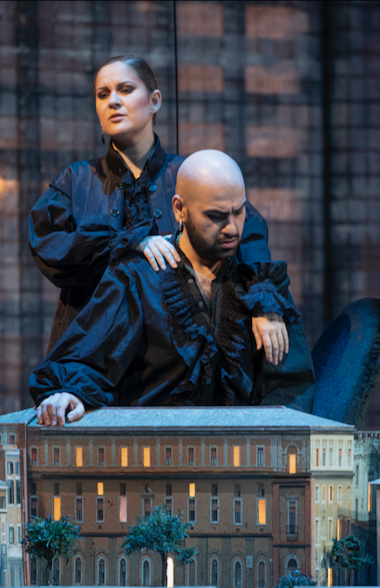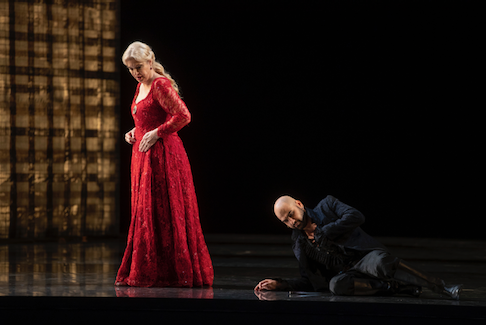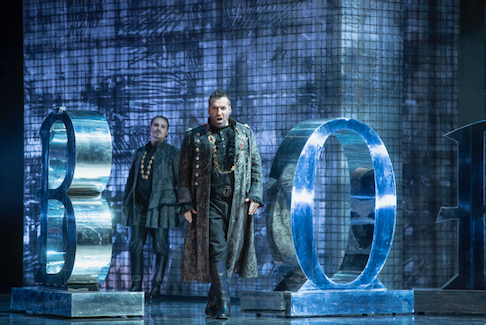Recently in Performances
English Touring Opera are delighted to announce a season of lyric monodramas to tour nationally from October to December. The season features music for solo singer and piano by Argento, Britten, Tippett and Shostakovich with a bold and inventive approach to making opera during social distancing.
This tenth of ten Live from London concerts was in fact a recorded live performance from California. It was no less enjoyable for that, and it was also uplifting to learn that this wasn’t in fact the ‘last’ LfL event that we will be able to enjoy, courtesy of VOCES8 and their fellow vocal ensembles (more below …).
Ever since Wigmore Hall announced their superb series of autumn concerts, all streamed live and available free of charge, I’d been looking forward to this song recital by Ian Bostridge and Imogen Cooper.
Although Stile Antico’s programme article for their Live from London recital introduced their selection from the many treasures of the English Renaissance in the context of the theological debates and upheavals of the Tudor and Elizabethan years, their performance was more evocative of private chamber music than of public liturgy.
Evidently, face masks don’t stifle appreciative “Bravo!”s. And, reducing audience numbers doesn’t lower the volume of such acclamations. For, the audience at Wigmore Hall gave soprano Elizabeth Llewellyn and pianist Simon Lepper a greatly deserved warm reception and hearty response following this lunchtime recital of late-Romantic song.
For this week’s Live from London vocal recital we moved from the home of VOCES8, St Anne and St Agnes in the City of London, to Kings Place, where The Sixteen - who have been associate artists at the venue for some time - presented a programme of music and words bound together by the theme of ‘reflection’.
'Such is your divine Disposation that both you excellently understand, and royally entertaine the Exercise of Musicke.’
‘And there was war in heaven: Michael and his angels fought against the dragon; and the dragon fought and his angels, And prevailed not; neither was their place found any more in heaven … that old serpent … Satan, which deceiveth the whole world: he was cast out into the earth, and his angels were cast out with him.’
There was never any doubt that the fifth of the twelve Met Stars Live in Concert broadcasts was going to be a palpably intense and vivid event, as well as a musically stunning and theatrically enervating experience.
‘Love’ was the theme for this Live from London performance by Apollo5. Given the complexity and diversity of that human emotion, and Apollo5’s reputation for versatility and diverse repertoire, ranging from Renaissance choral music to jazz, from contemporary classical works to popular song, it was no surprise that their programme spanned 500 years and several musical styles.
The Academy of St Martin in the Fields have titled their autumn series of eight concerts - which are taking place at 5pm and 7.30pm on two Saturdays each month at their home venue in Trafalgar Square, and being filmed for streaming the following Thursday - ‘re:connect’.
The London Symphony Orchestra opened their Autumn 2020 season with a homage to Oliver Knussen, who died at the age of 66 in July 2018. The programme traced a national musical lineage through the twentieth century, from Britten to Knussen, on to Mark-Anthony Turnage, and entwining the LSO and Rattle too.
With the Live from London digital vocal festival entering the second half of the series, the festival’s host, VOCES8, returned to their home at St Annes and St Agnes in the City of London to present a sequence of ‘Choral Dances’ - vocal music inspired by dance, embracing diverse genres from the Renaissance madrigal to swing jazz.
Just a few unison string wriggles from the opening of Mozart’s overture to Le nozze di Figaro are enough to make any opera-lover perch on the edge of their seat, in excited anticipation of the drama in music to come, so there could be no other curtain-raiser for this Gala Concert at the Royal Opera House, the latest instalment from ‘their House’ to ‘our houses’.
"Before the ending of the day, creator of all things, we pray that, with your accustomed mercy, you may watch over us."
The doors at The Metropolitan Opera will not open to live audiences until 2021 at the earliest, and the likelihood of normal operatic life resuming in cities around the world looks but a distant dream at present. But, while we may not be invited from our homes into the opera house for some time yet, with its free daily screenings of past productions and its pay-per-view Met Stars Live in Concert series, the Met continues to bring opera into our homes.
Music-making at this year’s Grange Festival Opera may have fallen silent in June and July, but the country house and extensive grounds of The Grange provided an ideal setting for a weekend of twelve specially conceived ‘promenade’ performances encompassing music and dance.
There’s a “slide of harmony” and “all the bones leave your body at that moment and you collapse to the floor, it’s so extraordinary.”
“Music for a while, shall all your cares beguile.”
The hum of bees rising from myriad scented blooms; gentle strains of birdsong; the cheerful chatter of picnickers beside a still lake; decorous thwacks of leather on willow; song and music floating through the warm evening air.
Performances

06 Feb 2019
Lucrèce Borgia in Toulouse
This famed murderess worked her magic on Toulouse’s Théâtre du Capitole stage, six dead including her beloved long lost son. It was Victor Hugo’s carefully crafted 1833 thriller recrafted by Italian librettist Felice Romano that became Donizetti’s fragile Lucrezia Borgia.
With the tightness of a short story, Felice Romano reunites mother with son at a party in Venice only to have the mother inadvertently poison her son at a party in Ferrara when all she had wanted to do was poison a few of his raucous friends. The plot is only slightly more complicated in that Lucrèce’s currently surviving husband Alphonse believes she is having an affair with her son, even though we know that possibly her son is having an affair with his best friend Maffeo Orsini.
It is a beautifully crafted opera, the story unfolding in highly structured musical numbers that encase the unstoppable series of obviously very tense situations. There are a lot of feelings to put on the table.
There is a delicate balance between ambience and emotion in bel canto, like there is a delicate balance between voice and pace — the emotions must flow but not rush nor may they falter. Italian conductor Giacomo Sagripanti created a plausible orchestral platform for bel canto, his more effective moments however were in his drives to the cadences that wrap up Donizetti’s emotive extensions. The maestro was obviously limited by the capabilities of his singers.
 Annick Massis as Lucrezia Borgia, Mert Süngü as Gennaro
Annick Massis as Lucrezia Borgia, Mert Süngü as Gennaro
If Annick Massis, the sixty-one year old French bel canto diva, masterfully projected Lucrezia’s Borgia family pride and a towering pride of maternity, she could not effect a resolute tone of voice. Carefully placing her voice far back in her throat she avoided the wide, unfocused, indeed indeterminate tones that I heard in her 2015 Monaco Mathilde (Guillaume Tell). This new placement erased all authority of tone, her quite clean, careful coloratura had no sheen or pizazz, limiting its effect.
Turkish tenor Mert Süngü too physically created a convincing persona, that of a swashbuckling young warrior. Though a fine singer and a solid performer Mr. Süngü did not find the elegance of voice or line to establish the potentially sublime magic for the young warrior’s feelings for his mother and for his friend Matteo.
Frankfurt Opera bass Andreas Bauer Kanabas (the final Kanabas is his recently appended Bohemian maternal family name) took on the role of Alfonso d’Este. His dark hued voice serves him well for quite a variety of roles in Frankfurt and elsewhere, but his voice does not have the brightness that make raging bel canto lines fly off the page. French ingenue mezzo Eléonore Pancrazi brought little presence to the tenor’s best friend Matteo Orsini. This spirit of random casting extended to the myriad of smaller male roles required by this opera.
 Andreas Bauer Kanabas as Alfonso d'Este, Thomas Bettinger as Rustighello (behind)
Andreas Bauer Kanabas as Alfonso d'Este, Thomas Bettinger as Rustighello (behind)
The 1917 production was from Valencia, Spain, by well-known (in California) Spanish director Emilio Sagi with his usual designers, Llorenç Corbella (sets) and Pepa Ojauguren (costumes). While Mr. Sagi moved his actors in easy accordance with the dramatic minimalism of Felice Romano’s libretto the physical production succumbed to an atmosphere of extravagant, abstract faux luxury. The result approached the questionable splendor of a sleek remake of a once grand, old hotel (ubiquitous metallic glints and lurid colors floating in chic blackness).
The legendary murderous excesses of Donizetti’s heroine Lucrezia Borgia universally seem to ignite hyper-active production imagination. Such response is at odds Felice Romano’s minimalism making Donizetti, finally, its victim.
Michael Milenski
Cast and production information:
Alfonso d’Este: Bauer Kanabas; Lucrezia Borgia: Annick Massis; Maffio Orsini: Eléonore Pancrazi; Gennaro: Mert Süngü; Liverotto: Galeano Salas; Vitellozzo: François Pardailhé; Gazella: Jérémie Brocard; Rustighello: Thomas Bettinger; Gubetta: Julien Veronèse; Ascanio: Rupert Grœssinger. Chorus and Orchestra of the Théâtre du Capitole. Conductor: Giacomo Sagripanti; Mise en scène: Emilio Sagi; Decors: Llorenç; Costumes: Pepa Ojanguren; Lights: Eduardo Bravo. Théâtre du Capitole, Toulouse, France, February 3, 2019.


